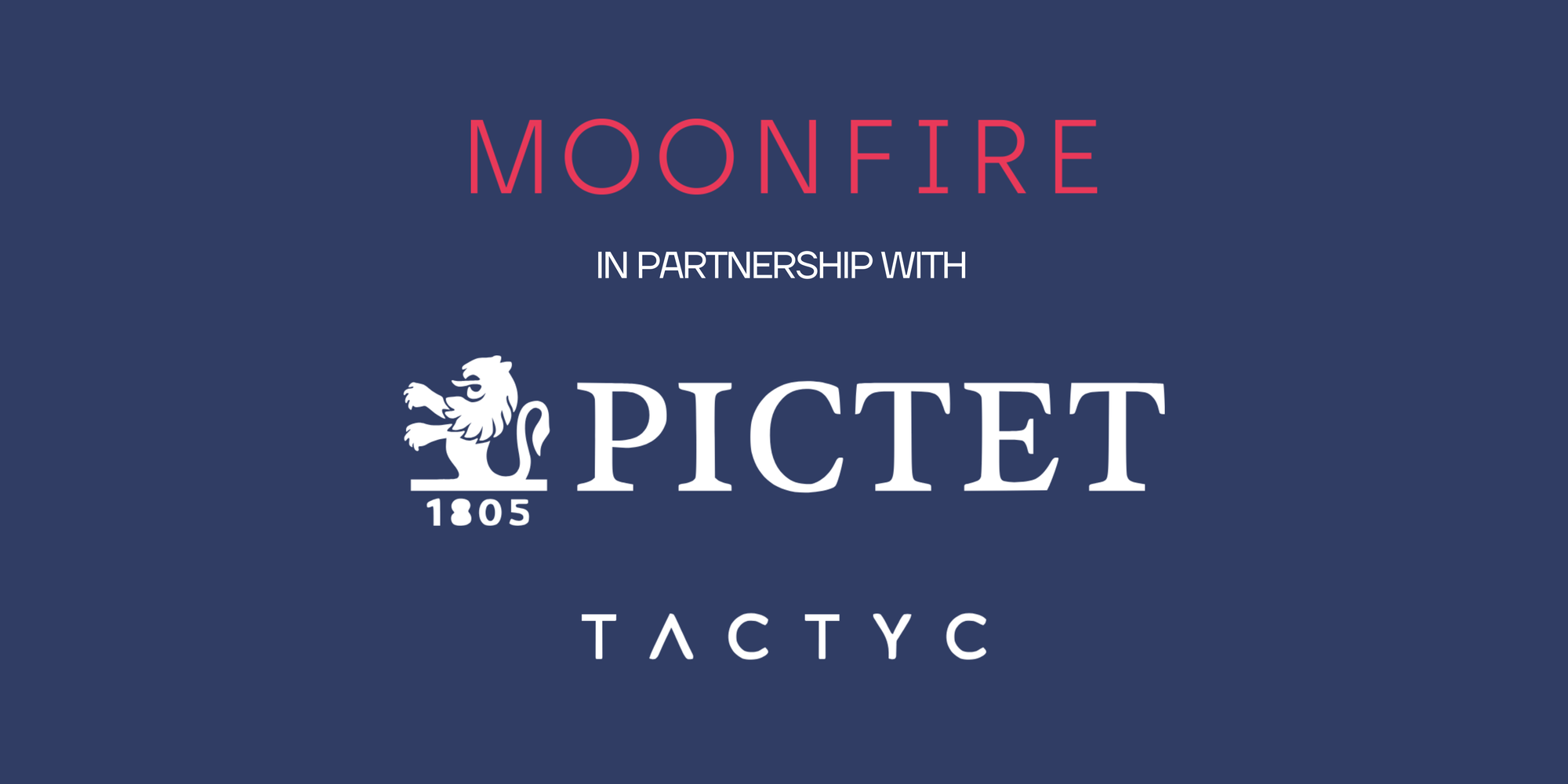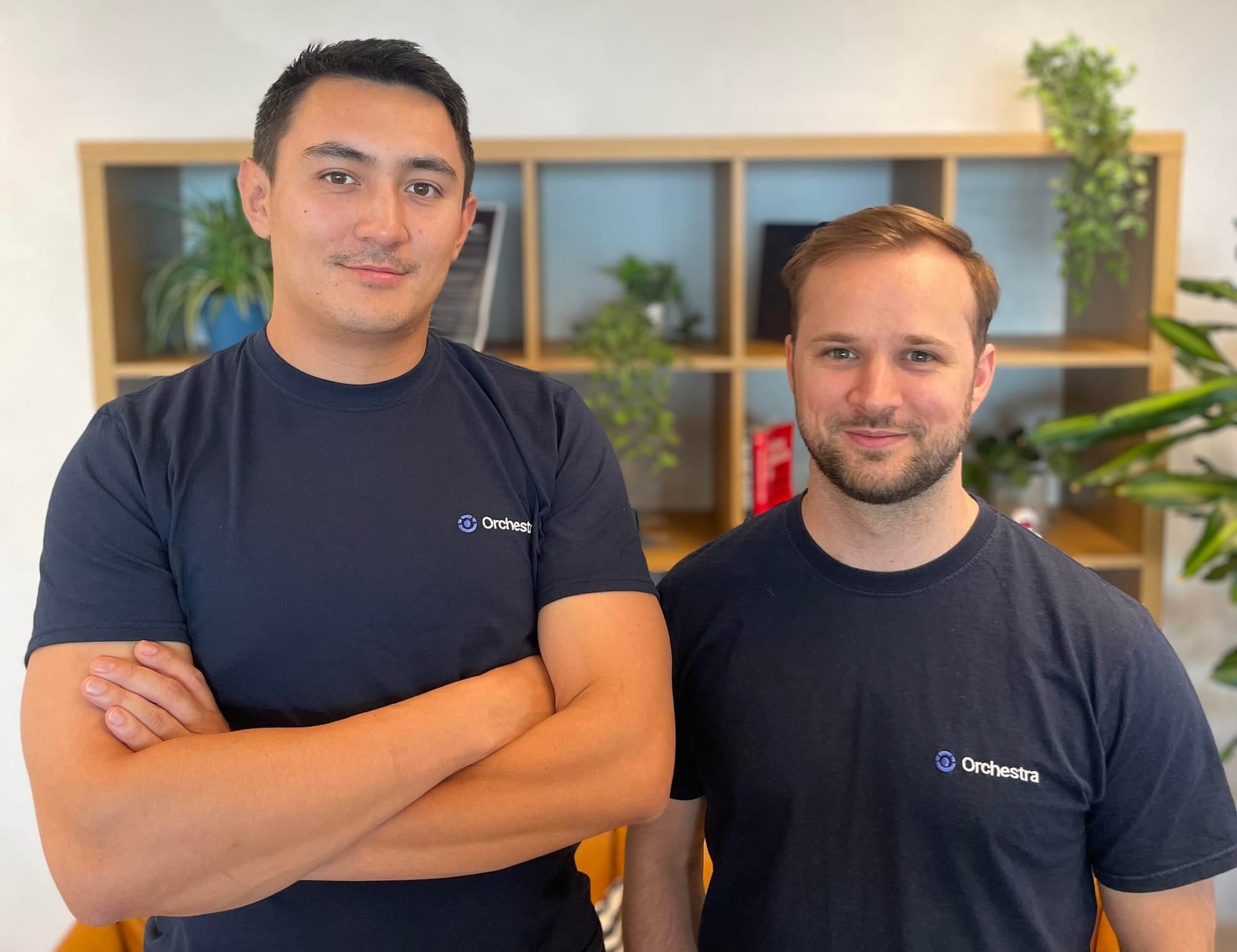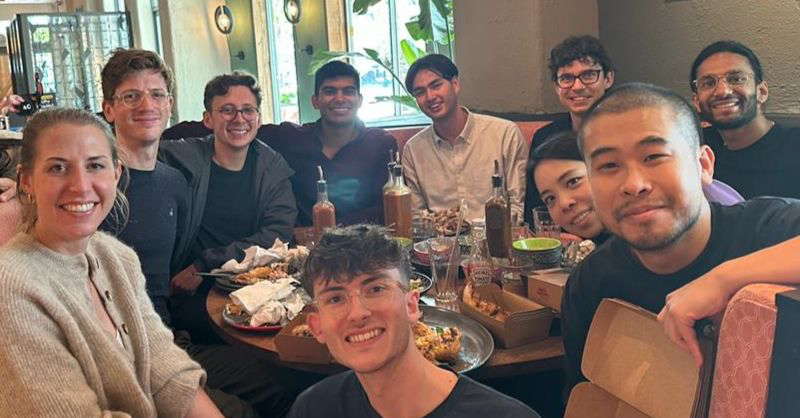July '24: Global from day one
This month we're talking about global sales, and sharing a lot of big news from our portfolio.

Hello and welcome to the July newsletter.
This month we're talking about global sales, and sharing a lot of big news from our portfolio.
Also, if you missed it, listen to the advice our founders would give to other tech company founders who are just starting their journey.
Enjoy.
Mattias and the Moonfire team
🌓🔥

The Snapshot
Here's a quick roundup of cool stuff we saw this month:
- Last month, we told you about Jonas's first quantum computing hackathon – now read his highlights and what he learned from running it.
- The power of mentorship. Looks specifically at the transmission of excellence from teacher to student in scientific research, but applies equally well to startups.
- You're not paying enough attention to your users.
- Why is medicine not progressing faster?
Portfolio Updates
Orchestra, Healthtech 1, GOALS
Orchestra raises £1m pre-seed

We’re delighted to be leading Orchestra’s £1m pre-seed, alongside Sequoia’s Scout Fund and angel investors from companies like dbt, Snowflake, and Snowplow.
Hugo and Will are building the data orchestration and observability tool for lean data teams. Data engineers and architects can spend less time fixing broken things and more time on what matters: building.
They’ve already won some big enterprise customers – Graniterock Construction, the San Francisco Giants, Powell Industries, Chobani, and Vision Labs – and they'll continue to develop the platform and expand their go-to-market strategy across Europe, Australia, and the US over the coming months.
Healthtech-1 raises £2.7m seed

We're also proud to be leading Healthtech-1's £2.7m seed round, joined by YC and a number of angels.
Pete and Raj are automating administrative tasks in primary care for the NHS, and are already deployed in 10% of GP practices in England – targeting more than 90% by the end of 2025.
GOALS releases first teaser
GOALS, the future of football gaming, released its first teaser trailer – and is calling for playtesters if you want to help shape it.
What's Up at Moonfire?
Global Sales: Start from Day One

For startups, the journey from local success to global prominence often begins with an early commitment to global sales. This year, at the Moonfire Pulse Summit, we explored this topic in our panel discussion "Global Sales: Let's Start from Day One."
Here, we share some of the insights offered by the panel of three inspiring founders from the Moonfire portfolio: Chris Evans, Co-Founder & Chief Product Officer at Incident; Lasse Kalkar, Founder & CEO at Liveflow; and Samuel Hassine, Founder & CEO at Filigran.
Each founder outlined some of the mechanisms that worked for their business. They are worth sharing because they demonstrate the variety of tactics available to founding teams and underscore the diversity of approaches out there.
No one-size-fits-all approach
Before we dive into the insights shared by the founders, it’s first worth dwelling on an important point emphasised by moderator Matt Robinson, Partner at Accel and Co-Founder of GoCardless and Nested: when it comes to global sales, there is no one-size-fits-all approach. Filter out all the noise about what you should be doing and tune in to what fits best with your business.
As Matt puts it, “You’ll hear that there are all these amazing tactics, but you can’t do them all. It’s far better to just do one or two things very well than do them all badly.”
So, in this spirit, we offer some of the lessons our founders shared in the hopes that others can find that one thing to take their sales global.
From Moment of Traction to Expansion: Ramping up Global Sales
Moving from initial traction to global expansion requires careful strategy and execution. This stage assumes that startups have certain fundamentals in place – like a strong inbound funnel, for example – and have refined their offering and outreach off the back of their first sales. Once the foundations have been laid and traction has been found, startups can ramp up their sales efforts with the following tried and tested steps.
Assess if you have local or global PMF
With 35% of startup failures attributed to lack of product-market fit (PMF), ensuring your offering aligns with market needs is essential. Targeting global sales introduces another dimension. Early startups intent on selling internationally need to determine if their product-market fit (PMF) is local or global. Matt shared a lesson from his experience: “One of our biggest fails was presuming every market was the same, and that every market would be the same playbook, and have the same level of PMF, and actually that distinction was a bit of a clicking moment for us, because our product was more localised … It was a global product, but every market you had to go in and win was different.”
Conversely, Chris described a more globally distributed initial customer base at Incident. “Our first 10 to 20 customers saw a healthy distribution from North America, a number from Europe, Australia, and South America, and they all turned up through an inbound motion,” he said. This broad initial interest highlighted the product's universal appeal. Understanding whether your PMF is local or global is a crucial input for your global sales strategy and market approach.
Find your point of greatest traction and apply pressure
Monitoring and adapting sales cycles based on geographical performance is crucial for effective scaling. Sam revealed, “We started to monitor very closely what the sales cycle looked like for inbound and we started to separate the fact that in some geographies the sales cycle is easier… So we really focused our effort on the geographies where it was working well. And then started to build local teams there.” By identifying and doubling down on regions where the sales cycle is most efficient, startups can maximise their resources and accelerate growth.
Use outbound to transition from growth by surprise
For early-stage startups, inbound sales can be worryingly erratic. Incident’s greatest sales challenge in the early days was being “reliant on an inbound motion that was relatively unpredictable,” according to Chris. They made the call to transition to an outbound approach in order to take more control: “Phase 2 for us was the first intentional step we took towards a more active global approach, which was layering on an outbound motion and leaning into the market that was showing the most traction… This phase was driven by a need to get some predictability into the business.” Shifting to outbound can help stabilise your growth trajectory and strategically target key markets.
Amplify your reach with community
Communities are powerful mechanisms for growing brand awareness, encouraging advocacy and driving referrals. Yet they are notoriously difficult to build. Liveflow decided to tap into existing communities instead: Lasse discovered that “service provider communities are extremely tight knit” and so “it was easier to build very strong word of mouth” through them.
Filigran took the opposite approach, committing to building community from the ground up. For Samuel, creating a community of brand champions became a “powerful advocacy mechanism.” Its success was multiplied by the high levels of workforce mobility in the cyber sector: “When you start to build champions who can advocate your tech within their teams, and your technology is maturing, those champions move from one company to another and they bring your technology with them.” Although time and resource intensive, it’s an approach that continues to pay. The insight on community is this: you don’t have to start from scratch, but if you do, you have to go all in to pull it off.
Build partner network channels
Some markets are simply harder to enter. In these instances, local expertise can make all the difference. Filigran’s Sam advised, “Think ‘partner network channel’ from day one to help you make inroads into hard-to-crack markets.” On-the-ground partners can provide valuable insights into market-specific needs, help tailor offerings and build credibility with their existing customer base.
The Pitfalls of Global Sales
Going global is fraught with challenges and potential missteps, but as our founders have demonstrated insight and experience can be wrung from every one. While each startup’s journey is unique, here are several common pitfalls that all would do well to avoid.
Pulling out of founder-led sales too early
Founder-led sales are crucial in the early stages of a startup – founders bring unique passion and knowledge about their product to every sales conversation. But when other responsibilities start to stack up, it can be tempting to delegate. Chris shared a difficult lesson from Incident’s journey: “Pulling out of founder-led sales too quickly was a mistake in the early days. When we hired our first reps, we all got very excited and thought, ‘what are we going to do with our time now?’ And then nobody sold anything… That was a big learning for us. We are three years in now and up to 80 people and I am still on multiple sales calls every week.” Maintaining founder involvement until the process is well-established is critical. Depending on the business, the founding team may continue to play a role long past laying the foundations.
Making big sales hires that don’t fit the business
The true cost of a bad sales hire is difficult to calculate, but there is a strong argument that says it’s multiples of a sales executive’s salary. And that’s why hiring the right sales team is crucial for an early startup’s growth and success. Lasse shared a painful lesson learned at Liveflow. “One of the big mistakes was having this idea in our heads that we had to hire these very experienced enterprise sellers,” he admitted. This was despite Liveflow having fast deal cycles and targeting high volume transactional sales with mid-market customers. Lasse continued, “So we hired people who had sold deals that were much bigger than ours… We had to spend quite a bit of time reorging after that. It sounds so obvious in hindsight.” This experience underscores the importance of aligning sales hires with the specific needs and sales processes of your business to avoid costly and time-consuming mistakes.
Underestimating sales rep onboarding
Getting the onboarding process wrong for new sales hires is another pitfall that should be avoided. Recognise that it takes time. The average ramp-up time for sales reps is estimated between 6 and 9 months. As Lasse again explained, “New hires should have just been shadowing founders and sellers during the sales cycle for the first three months and told to just go and replicate that, because it was working.” Without proper onboarding, new hires may struggle to understand the product and sales process, leading to slower ramp-up times and missed opportunities.
Relentlessly chasing ‘push’ sales
When founders feel pressured, they might be tempted to go all in on the hard sell, but chasing ‘push’ sales alone won’t work. As Matt shared, “All of our failures came from ambition to grow and trying to impose our will on the business, saying we’re going to do this to make us grow faster.” Instead, it’s about listening for the ‘pull’ signals, the signs that things are working somewhere, and focusing your efforts there. Matt went on to explain, “Everything that worked came from Pull sales. Like, we have people trying to use this product in this way over here, how do we empower them to do that more, or find people who look really similar?” Shoehorning your sales strategy to fit your vision of the world won’t work. Allowing for an interplay between ‘push’ and ‘pull’ tactics will make for a more adaptable and responsive sales approach – and increase your odds of success.
There is no ‘right way’ to go global
Taking your startup from a local presence to a global player is a challenging journey, but by focusing on global sales from the outset founders can set themselves up for success. The insights shared by our portfolio founders revealed that each is pursuing a different strategy: there is no one-size-fit-all approach, no ‘right way’ of going global.Instead, it’s crucial to tailor strategies to your specific business needs, concentrating on a few key tactics and executing them well.
At Moonfire, our mission is to support early-stage startups in navigating these complexities and unlock their next phase of growth. By tapping into the experience of founders who have been there and done it, you can avoid common pitfalls and put your startup on a path to sustainable global growth.
As always, it’s important to embrace the challenge, stay adaptable, and use the wisdom of those who have gone before you to guide the way.
– Akshat 🌓🔥
Podcast of the Month
The Social Radars: Emmett Shear, Co-Founder of Twitch
Great episode from last year with Emmett Shear – one of YC's first batch back in 2005 and co-founder of Twitch. He talks about how Twitch grew from one guy walking around with a camera on his head to one of the biggest communities on the internet. Masterclass on how to build. Reminded me of his excellent thread on product market fit from a few years ago.
Good Read of the Month
'The Beginning of Infinity: Explanations That Transform the World' by David Deutsch

This is the story of human progress – and how it's just the start of a road to infinity. Deutsch argues that our capacity for innovation and problem-solving is limitless. With the right knowledge, and we humans – and perhaps eventually AI – capable of explaining everything that is explicable, all problems can be solved. If only we choose to do so. An inspirational, optimistic book.
That’s all for this month.
Until next time, all the best,
Mattias and the Moonfire team
🌓🔥

